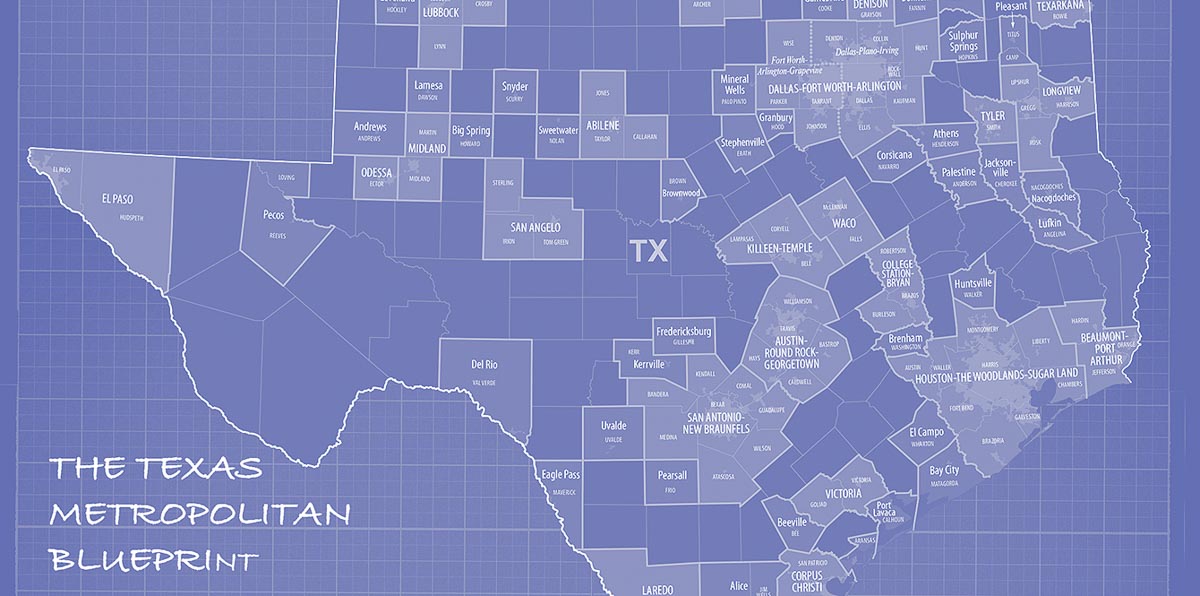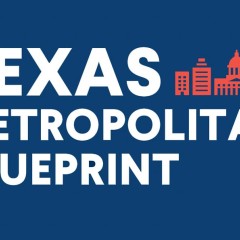For all its wide-open spaces, Texas is among America’s most urbanized states. No less than 90% of Texans live in metro areas as defined by the U.S. Census Bureau. The Dallas-Fort Worth, Houston and Austin metros all are among the 10 fastest-growing in the U.S. — with DFW and Houston in first and second place, far ahead of all other metropolitan areas in the nation. And most of this metropolitan growth is occurring in cities large and small.
Furthermore, these metros are economic powerhouses. It’s well known that a number of major corporations have moved from California to Texas recently. But, less well known is how deep these metropolitan economies are overall. For example, of the 345,000 new jobs that Texas created in 2019, 71% were located in the DFW, Houston and Austin metros. Even energy production, largely concentrated in rural Texas, is driven by the technology brainpower that is clustered in the state’s metros.
In other words, cities and suburbs are Texas these days. And that’s why Texas needs a metropolitan agenda.
This week, in an unprecedented collaboration, our three institutions — the LBJ School of Public Affairs at UT Austin, the SMU-Bush Institute Economic Growth Initiative in Dallas, and the Kinder Institute for Urban Research at Rice University in Houston — issued the state’s first “metropolitan blueprint.” It’s meant to be a road map that will move Texas toward a prosperous and successful metropolitan future. And we believe it comes not a moment too soon.
Texas can thank its business-friendly climate for its rapid growth up until now. But Texas’ metros are not on a sustainable path: the rapid pace of urban and suburban growth has created challenges, even without the COVID-19 crisis. Before the pandemic emptied out urban business districts, Texas’ cities and suburbs had become notorious for their traffic congestion. Travel between the nodes of the Texas Triangle is time-consuming and inefficient. Governor Greg Abbott has acknowledged that road-building alone can no longer suffice to meet the state’s transportation needs.
In moving metropolitan Texas to the forefront of state policy, three guiding principles undergird our recommendations:
1. Texas should invest in Texans
Texans are suffering, and this is holding back the state’s business growth and prosperity. While Texas’ low-tax, low-regulation environment is good for business attraction, in order to ensure continued prosperity, the state’s growth must be supported by substantial investments in its physical and human infrastructure.
2. Texas should empower local communities
Admittedly, this is a controversial view — but not an irrational one. Texas’ governor and legislature have increasingly sought to restrict local jurisdictions’ power — a move away from the traditional conservative view that governance should occur as close to the people as possible. Texas should be empowering local innovation, not blocking it.
3. Texas needs solutions that are Texan
Texas needs to build a metropolitan agenda consistent with its deeply ingrained free-market traditions. Rather than emulating the centralized, top-down governance models of New York or California, Texas should become a leader in advancing cross-sector, market-driven solutions to pressing metropolitan challenges.
Building on those cross-cutting themes, the Texas Metropolitan Blueprint is focused on these three key aspects of metropolitan progress:
1. Economic Development
More than 90% of Texas’ economic activity takes place in the state’s metros, and the bulk of its future growth will be concentrated in the five largest. The challenge: Build a more resilient and sustainable infrastructure that is suited to the globalized 21st-century knowledge economy. One high priority that’s important to both urban and rural Texas is better broadband connections. Another example: Cross-border collaboration to advance the resilient economic development efforts of Texas’ border and port cities. The state’s ports and airports are critical gateways to global commerce.
2. Housing and Land Use
Housing, particularly housing security and affordability, is becoming a central issue for Texans — 68% believe that the government should act decisively to address them. Rising real estate prices are eating into the cost advantage that has been a key attractor for Texas metros. The state and its metro areas must look for innovative and collaborative ways to expand the supply of affordable housing for the Texas workforce. Local jurisdictions must allow greater flexibility in land-use rules in order to maximize the production of market-rate housing. But, Texas must also encourage more collaboration among the for-profit, nonprofit and public housing sectors in order to maximize the availability of affordable housing for those who need it.
3. Transportation and Infrastructure
Metropolitan Texas needs a metropolitan infrastructure for the 21st century, which means broadband, high-tech movement of freight, and better and more pandemic-responsive transportation options within and between cities. It also means investments in flood control and water/sewer systems to deal with climate change and population growth. The pandemic has shown us that we must define infrastructure broadly, but also allow localities to raise revenue to fund their own infrastructure initiatives.
Our focus on metropolitan Texas does not mean that we do not believe rural Texas is important. Rural residents are struggling as well. But contrary to the way popular culture depicts this divide, metropolitan and rural Texas are not separate. They are deeply intertwined economically, and the continued prosperity of metropolitan Texas is critical to the success of rural Texas. The state must take steps to reinforce this metropolitan prosperity — but also to ensure this success stimulates new prosperity in rural areas as well.
The report also aims to build on the important efforts of other policy initiatives such as Texas 2036, local economic development and community development organizations, and area chambers of commerce that are advancing improvements in education, workforce development, public health and resiliency.
It is long past time for Texas’ leaders to recognize that Texas is a metropolitan state with a highly developed 21st-century economy focused on such sectors as tech, medicine and the energy transition. We hope the Texas Metropolitan Blueprint will be an important first step toward reframing Texas’ future in a way that reflects the reality of the state today.
William Fulton is the Director of the Kinder Institute, and Kyle Shelton is the Institute’s Deputy Director. Steven Pedigo is the Director of the Urban Lab at the LBJ School of Public Affairs at UT Austin. J.H. Cullum Clark is the Director of the SMU-Bush Institute Economic Growth Initiative in Dallas.


